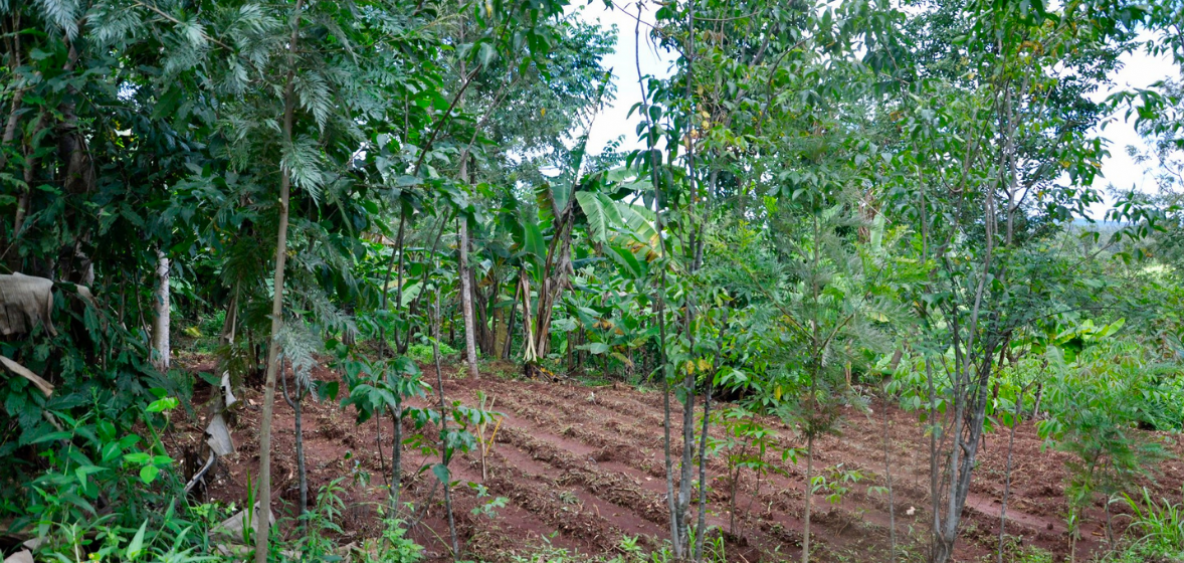
Land tenure and all its implications is a hot topic in food systems dialogue because it not only determines the legal agency a small-scale producer has on their land but also affects their willingness to invest their time and resources in sustainable farming practices. In informal tenure systems, the threat of losing access to land that one has invested in is enough to compel farmers to maintain the status quo and favour practices that don’t require additional inputs; if it isn’t broken, why fix it, right?
The problem herein is that the system is indeed broken, and land degradation, exacerbated by climate change, is making it increasingly more difficult for farmers to turn a profit and maintain the livelihoods of themselves and their families under these conditions. Drought, erratic weather, and rising temperatures only enhance the land and soil degradation driven by deforestation and agricultural expansion that is so prevalent in many parts of Africa.
RFS is working to facilitate community-led food and land rehabilitation systems in 12 Sub-Saharan African countries that operate in tandem with tenure systems, cognizant of the nuance that each context presents to project activities. It’s not always easy, but it’s a challenge worth undertaking to reverse land degradation and improve the lives of rural people.
Land tenure is a major roadblock for scaling up land restoration and reversing degradation. In 2012, the Committee on World Food Security, based at the Food and Agriculture Organization of the United Nations (FAO), officially recognized the central role that tenure plays in achieving the Sustainable Development Goals by endorsing a set of Voluntary Guidelines on the Responsible Governance of Tenure of Land, Fisheries and Forests in the Context of National Food Security (VGGT).
This guide seeks to advance food security by “allow[ing] governments, civil society, the private sector and citizens to judge whether their proposed actions and the actions of others constitute acceptable practices” when it comes to land strategies.
In 2019, at the 14th session of the Conference of the Parties (COP14) in New Delhi (click here to learn more about RFS’s side event!), the United Nations Convention to Combat Desertification (UNCCD) adopted their note titled ‘New and emerging issues: land tenure’. In support of advancing Land Degradation Neutrality (LDN) activities, RFS Regional Hub partner FAO has collaborated with UNCCD in raising awareness and building capacity on the technical guide for integrating VGGT into LDN policies and activities at the country level. This collaboration intends to incorporate emerging messages and lessons from Sub-Saharan Africa into the Technical Guide to be presented at COP15 in 2022.
The guide will focus on the following 9 pathways towards actions at the national and local scale in addressing tenure challenges for achieving LDN:
In September and October of 2021, FAO held a series of webinars to build capacity and engage with stakeholders including policy and decision-makers, UNCCD national focal points, civil society representatives, project managers and technical advisors from FAO, RFS, the EU Land governance program, LDN Technical working group members, national or regional gender constituencies and other initiatives in the region. As a group, these participants gathered and shared insights on the challenges of integrating VGGT into LDN. The target region was Sub-Saharan Africa and included representatives from initiatives in seventeen countries, including the twelve countries that make up the RFS programme.
The webinars targeted the nine pathways to action and gathered knowledge from policymakers and stakeholders that are context-specific through facilitated discussion groups that ran in parallel to the webinars. Read more on the FAO website.
The takeaways from the series were varied, vast and incredibly informative, most notably revealing the importance of mainstreaming gender equality into land tenure governance, the role of community-based institutions, and the importance of empowerment through capacity development. Some participants discussed patriarchal land inheritance in their contexts, others highlighted the importance of community-led institutions in managing grievances and disputes. At the heart of the discussions was a common theme: participatory land-use planning.
Case studies, stakeholder and policymaker experiences, methodologies and more are being collected and transformed into a final summary report titled “Lessons Learned on the Challenges in Integrating VGGT into LDN”.
This report and the insight gained from the webinar series will be invaluable in informing the practices laid out in the technical guide from UNCCD and FAO for COP15 in April and May of 2022.
There is no single solution for implementing equitable land governance, but there certainly is collaborative action, knowledge sharing and a global push for sustainable land management that are driving actors in Sub-Saharan Africa to find new ways to support rural people.
Stay tuned to see how the VGGT agenda progresses with the support of RFS country projects and partners!
Subscribe to our monthly newsletter to receive updates on stories directly from the field across all our projects, upcoming events, new resources, and more.